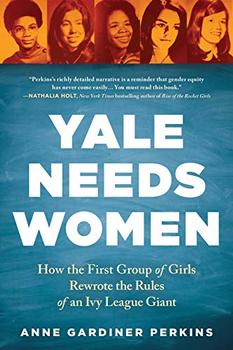Summary | Excerpt | Reading Guide | Discuss | Reviews | Beyond the Book | Readalikes | Genres & Themes | Author Bio

How the First Group of Girls Rewrote the Rules of an Ivy League Giant
by Anne Gardiner Perkins
A girlfriend was "the most prized piece of chattel in the college man's estate," explained one Yale student, but not just any girl would do. She had to come from one of the colleges thought suitable for future Yale wives, and she had to be pretty. If a guy brought a good-looking girl with him into one of Yale's dining halls, his classmates would show their approval by banging their spoons against their water glasses. Guys who arrived with a date thought unattractive would get ribbed about it later. And so the Yale men chose carefully.
A Yale sophomore appraised the women who now filled the room, picked out one of them, and approached her with his long-practiced line: "Say, aren't you from California?"
She was not, but the two chatted anyway, trading hometowns and majors. All the while, both scanned the room—was there someone better to be paired with?
In the next room over, the dining hall had been turned into a dance floor, with chairs and tables shoved over to the side, the lights turned low. A young man asked one of the newly arrived women if she wanted to dance. She smiled, and the two entered the room.
A band blared saxophone and electric bass from the front, the music so loud that conversation was impossible. There was little to do but nod and smile, pretending to hear what the other person said. A few couples over, one girl, put off by her partner's awkward dance moves, pretended she was dancing with the guy next to him. The song ended, and she retreated to the ladies' room, hoping he would be with someone else when she returned. The pairs in the room re-shuffled, with men who sought a new partner excusing themselves to get a beer and women who wanted to move
on explaining they needed to go find their roommates. The code in both cases was the same—not you.
Through the first two hours of the mixer, the cycle continued—choose, discard; choose, discard; choose, discard—a game of musical chairs where each person hoped not to be the one who turned up alone when the music stopped.
"Say, aren't you from California?"
By 10:00 p.m., the pairings became less fluid, the matches more firm. The question shifted: Would you like to see my room?
A senior with long blond hair had heard this line too many times before. "No," she answered, "I know all about your room." It had been a long night for her already. A Yale freshman had offered to give her a tour of the campus. Another guy had offered to show her his rock collection. As one Yale man observed, "Some girls that I've talked to have the idea that all we want from them is sex. Maybe they're right, but what else can you do when you don't get to know them and haven't got the time to establish a natural relationship?"
At midnight, the buses readied to leave, and the women filed back out through the stone archway, some coming from the depleted crowd at the mixer and others from the men's rooms they'd been visiting. The opening into Yale's village of men once again closed. The buses of women pulled out and began the long drive home while the men pushed the dining hall tables and chairs back into place and the band carted away its instruments. All that was left was the smell of the beer. And so the rhythm of Yale continued as it always had, with men-only weeks followed by weekends with women. Change, however, hovered just around the corner. But no one at Yale seemed to realize how fast it would come.
* * *
The school year passed. Another class of Yale men graduated, and a new one readied to take its place, just as the cycle had gone for decades. Yet beneath that veneer of sameness, things were shifting at Yale, and Kingman Brewster Jr., Yale's president, was the reason.
By 1968, Brewster was in his fifth year as president and had established himself as a leader who was determined to bring about change. He had tasked his admissions director with increasing the numbers of black students at Yale, and he'd supported black students' efforts to create an Afro-American studies major, one of the first in the nation. He increased the financial aid budget so that all admitted students could attend and halted the admissions office practice of checking on students' family income before deciding whether or not to admit them. Brewster had hired some of the most renowned academics in the nation to strengthen the faculty and raised Yale's profile in the national press. And in the process of all of this, he had attained a prominence that surpassed that of most politicians.
Excerpted from Yale Needs Women: How the First Group of Girls Rewrote the Rules of an Ivy League Giant by Anne Gardiner Perkins. © 2019 by Anne Gardiner Perkins. Used with permission of the publisher, Sourcebooks. All rights reserved.
Your guide toexceptional books
BookBrowse seeks out and recommends the best in contemporary fiction and nonfiction—books that not only engage and entertain but also deepen our understanding of ourselves and the world around us.